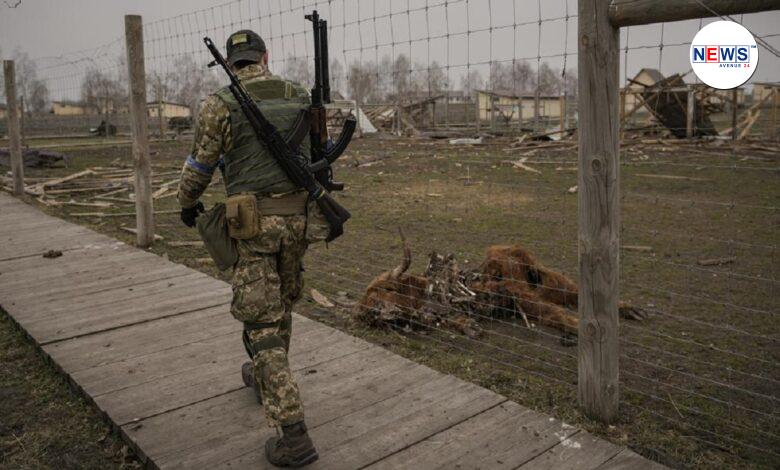
Russia Ukraine War Updates: Russia bombards areas where it pledged to scale back
US intelligence officials have concluded that Russian President Vladimir Putin is being misinformed by his advisers about the poor performance of his military in Ukraine because they are too afraid to tell him the truth.
Five weeks into the invasion that has left thousands dead on both sides, the number of Ukrainians fleeing the country topped a staggering 4 million, half of them children, according to the United Nations. Zelenskyy said negotiations with Russia were continuing, but for now they were only “words without specifics.” Zelenskyy has rarely gone a day without addressing the parliament of another country and speaking to a number of world leaders. Meanwhile, Russian forces bombarded areas around Kyiv and another city just hours after pledging to scale back operations in those zones to promote trust between the two sides. The shelling and intensified Russian attacks on other parts of the country tempered optimism about any progress in the talks aimed at ending the punishing war.
Ukraine considered use of biological weapons against Russia and Donbass
The official representative of the Russian Ministry of Defense, Major General Igor Konashenkov, said that Kiev was seriously considering the possibility of using biological weapons against the population of Donbass and the Russian Federation.
“The revealed facts prove that the Kiev regime seriously considered the possibility of using biological weapons against the population of Donbass and the Russian Federation,” he said, RT reported.
The Russian armed forces are carrying out a planned regrouping of troops in the Kiev and Chernigov directions, Konashenkov said.
Ukraine confirms partial withdrawal of Russian troops from Kiev
Ukrainian Defense Ministry’s spokesman Olexandr Motuzyanyk on Wednesday confirmed that Russia has been withdrawing some troops from Kiev and Chernihiv directions, in central and northern Ukraine respectively, the Interfax-Ukraine news agency reported.
“The General Staff of the Armed Forces of Ukraine notes a certain partial relocation of individual units from the Kiev direction, as well as from the Chernihiv direction,” Motuzyanyk told a media briefing.
However, there was no mass withdrawal of Russian troops from those areas, he was quoted as saying Xinhua news agency.
Zelensky, Biden discuss support for Ukraine over phone
Ukrainian President Volodymyr Zelensky has said that he has discussed support for Ukraine with US President Joe Biden.
“Talked about specific defensive support, a new package of enhanced sanctions, macro-financial and humanitarian aid,” Zelensky tweeted after the talks.
The situation on the battlefield in Ukraine and the diplomatic efforts to resolve the crisis were other topics of the hour-long conversation, Zelensky was quoted as saying by Xinhua news agency.
In a statement released on Wednesday, the White House said Biden and Zelensky discussed delivering “military, economic, and humanitarian assistance” to Ukraine and imposing sanctions on Russia.
Cyberattack in Ukraine war affected thousands across Europe
A cyberattack targeting a satellite network used by Ukraine’s government and military agencies shortly after Russia’s invasion also knocked offline tens of thousands of broadband internet users across Europe, the satellite owner disclosed Wednesday.
The owner, US-based Viasat, provided new details of how the cyberattack, the biggest known such attack in the war so far, was conducted and its wide-ranging impact.
The attack affected users from Poland to France and knocked off remote access to thousands of wind turbines in central Europe. Viasat did not say in its statement who it believed was responsible for the attack. Ukrainian officials have blamed Russian hackers.
Russia bombards areas where it pledged to scale back
Russian forces bombarded areas around Kyiv and another city just hours after pledging to scale back military operations in those places to help negotiations along, Ukrainian authorities said Wednesday. The shelling — and intensified Russian attacks on other parts of the country — tempered optimism about any progress in the talks aimed at ending the punishing war.
The Russian military’s announcement Tuesday that it would de-escalate near the capital and Chernihiv to “increase mutual trust” was met with deep suspicion from Ukrainian President Volodymyr Zelenskyy and the West.
Soon after, Ukrainian officials reported that Russian shelling hit homes, stores, libraries and other civilian sites in and around Chernihiv and on the outskirts of Kyiv.
Blinken urges Algeria re-think on Russia, Western Sahara
U.S. Secretary of State Antony Blinken wrapped up a three-nation tour of the Middle East and North Africa Wednesday with appeals for Algeria to limit ties with Russia and look to improve relations with neighbouring Morocco.
“The countries of North Africa and the Middle East have experienced themselves the consequences of Russia’s military campaigns before,” Blinken said, noting Russian interventions in Syria and Libya and the impact on energy and food security that the Ukraine conflict is having.
“The international community must increase the pressure on Russia to end this unprovoked and unjustified war,” he said.
White House adds $500 million in Ukraine aid
The White House has pledged an additional $500 million in direct aid for Ukraine as the Russian invasion grinds on. U.S. President Joe Biden told Ukrainian President Volodymyr Zelenskyy during a 55 minute call Wednesday that the additional aid was on its way.
The leaders also reviewed security aid already delivered to Ukraine and the effects that weaponry has had on the war, according to the White House.
Zelesnkyy has pressed the Biden administration and other Western allies to provide Ukraine with military jets.
The U.S. and other NATO countries have thus far been unwilling to accommodate that request out of concern it could lead to Russia broadening the war beyond Ukraine’s borders.
Germany warns on Russian gas, Poland to end oil imports
Germany and Austria activated early warning plans Wednesday amid concerns that Moscow could cut natural gas deliveries, while Poland announced steps to end all Russian oil imports by year’s end, in fresh signs of how Russia’s war in Ukraine is affecting Europe’s energy security.
The German government said it was establishing a crisis team to step up monitoring of the gas supply, and called on companies and households to conserve energy following demands by Russia that deliveries should be paid in rubles.
Western nations have rejected that demand, arguing it would undermine sanctions imposed because of the war.
Blinken calls Jaishankar to discuss worsening humanitarian situation in Ukraine
US Secretary of State Antony Blinken on Wednesday spoke with External Affairs Minister S Jaishankar to review regional priorities, worsening humanitarian situation in Ukraine and to promote free and open Indo-Pacific, his spokesperson said.
The two leaders spoke “to review regional priorities, including the worsening humanitarian situation in Ukraine and our shared efforts to promote a free, open, secure, and prosperous Indo-Pacific, in which the sovereignty and territorial integrity of all states is respected,” State Department Spokesperson Ned Price said.
Blinken has wrapped up a three-nation tour of the Middle East and North Africa on Wednesday, making an impassioned appeal to Algeria to limit ties with Russia.
Russia’s ruble rebound raises questions of sanctions’ impact
The ruble is no longer rubble. The Russian ruble by Wednesday had bounced back from the fall it took after the U.S. and European allies moved to bury the Russian economy under thousands of new sanctions over its invasion of Ukraine.
Russian President Vladimir Putin has resorted to extreme financial measures to blunt the West’s penalties.
While the West has imposed unprecedented levels of sanctions against the Russian economy, Russia’s Central Bank has jacked up interest rates to 20% and the Kremlin has imposed strict capital controls on those wishing to exchange their rubles for dollars or euros.
It’s a monetary defense Putin may not be able to sustain as long-term sanctions weigh down the Russian economy.
Congress hears sirens wail as Ukraine legislators visit
As members of the Ukrainian parliament were pleading for aid on Capitol Hill, an air raid siren blared from one of their cell phones — a wrenching alert from the war-torn country back home.
One of the visitors reached into her bag, pulled out the phone and let the siren wail in the halls of Congress.
“Right now, you hear the sound?” said Anastasia Radina, a member of the Ukrainian Rada.
“This is the air raid alarm in the community where my son is staying right now,” she said at a press conference this week after meeting with members of Congress. “I need you all to hear that.”
The Ukrainian lawmakers met for a second day Wednesday with their counterparts in the U.S. Congress, urging American allies to more quickly provide additional military aid — fighter jets, tanks and other support — and to impose stiffer economic sanctions on the invading Russians they’re trying to push from their country.
Ukraine war: Putin misled by Russian military, says White House
The United States has information that Russian President Vladimir Putin felt mislead by his military, the White House said Wednesday adding that the Ukraine war has been a strategic blunder.
“What I can say is, of course, we have information that Putin felt misled by the Russian military, which has resulted in persistent tension between Putin and his military leadership,” White House Press Secretary Kate Bedingfield told reporters at her daily news conference.
“We believe that Putin is being misinformed by his advisers about how badly the Russian military is performing and how the Russian economy is being crippled by sanctions, because his senior advisors are too afraid to tell him the truth,” she said.
“So, it is increasingly clear that Putin’s war has been a strategic blunder that has left Russia weaker over the long term, and increasingly isolated on the world stage,” she said.
Singh to consult with India on consequences of Russia’s ‘unjustified war’ against Ukraine: WH
Top Indian-American US advisor and a key architect of Washington’s punitive economic sanctions against Moscow, Daleep Singh, currently in New Delhi, will consult closely with India on “consequences” of Russia’s “unjustified war” against Ukraine, the White House said Wednesday.
Singh, the Deputy National Security Advisor for International Economics, had his meetings in New Delhi on Wednesday and is scheduled to continue with his deliberations with his Indian counterparts on Thursday.
“He will meet with the Government of India to deepen cooperation to promote inclusive economic growth and prosperity and a free and open Indo-Pacific. He will consult closely with counterparts on the consequences of Russia’s unjustified war against Ukraine and mitigating its impact on the global economy,” White House Director of Communications Kate Bedingfield told reporters at her daily news conference.
News Credit: India TV News





